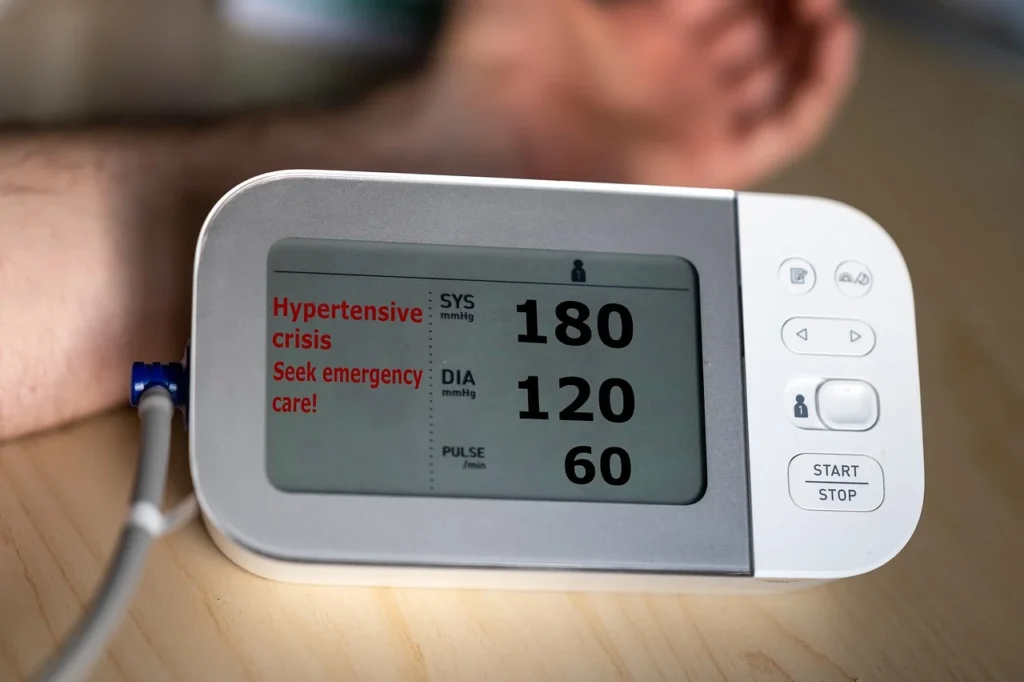Hypertension

Causes of Hypertension (Hypertension kya hota hai)
– Genetic Factors: Family history can play a significant role. Certain genes may increase the risk of developing high blood pressure.
– Lifestyle Factors:
– Diet: High salt intake, excessive alcohol consumption, and diets high in saturated fats can contribute to hypertension.
– Exercise: Lack of physical activity can lead to weight gain and higher blood pressure.
– Stress: Chronic stress can contribute to hypertension.
– Medical Conditions:
– Kidney Disease in Hypertension: The kidneys play a key role in regulating blood pressure. Kidney disease can disrupt this balance.
– Thyroid Problems: Both hyperthyroidism and hypothyroidism can affect blood pressure.
– Sleep Apnea: This condition can cause blood pressure to rise.
High BP Symptoms:
– Often called the “silent killer” because many people do not experience symptoms.
– When symptoms do occur, they may include:
– Headaches
– Shortness of Breath
– Nosebleeds
– Dizziness or Visual Changes
Types of Hypertension:
– Primary (Essential) Hypertension: This is the most common type, with no identifiable cause. It develops gradually over many years.
– Secondary Hypertension: This type is caused by an underlying condition, such as kidney disease, adrenal gland tumors, or certain medications.
Diagnosis of Hypertension
– Blood Pressure Measurement: A cuff is used to measure systolic and diastolic pressures.
– Ambulatory Blood Pressure Monitoring: A device worn throughout the day to measure blood pressure at regular intervals.
– Home Blood Pressure Monitoring: Patients monitor their blood pressure at home using a digital monitor.
Complications of Hypertension
– Heart Disease: Increased risk of heart attack, heart failure, and left ventricular hypertrophy.
– Stroke: Elevated blood pressure can cause damage to blood vessels in the brain, leading to a stroke.
– Kidney Damage: High blood pressure can damage the arteries around the kidneys, leading to kidney disease.
– Vision Loss: Hypertension can damage the blood vessels in the eyes, leading to retinopathy and vision loss.
Treatment of Hypertension (Which Hypertension Medicine is Best)
– Lifestyle Changes:
– Diet: Adopt a healthy diet, such as the DASH diet.
– Exercise: Regular physical activity can help lower blood pressure.
– *Stress Management*: Techniques like yoga, meditation, and deep breathing can help reduce stress.
– Medications:
– ACE Inhibitors: Relax blood vessels by blocking the formation of angiotensin.
– Beta-Blockers: Reduce the heart rate and the heart’s output of blood.
– Diuretics: Help the kidneys remove sodium and water from the body.
– ARBs
Hypertension and Diet (Hypertension Diet)
– DASH Diet: Focuses on fruits, vegetables, whole grains, and lean proteins while reducing salt and saturated fats.
– Low Sodium Intake: Aim for less than 2,300 mg of sodium per day, ideally less than 1,500 mg.
– Potassium-Rich Foods: Bananas, oranges, potatoes, and spinach can help balance sodium levels and reduce blood pressure.
Hypertension in Special Populations (Hypertension in Pregnancy)
– Pregnancy: Hypertension can lead to preeclampsia, a serious condition that can threaten the life of both mother and baby.
– Elderly: Blood vessels naturally stiffen with age, increasing the risk of hypertension.
– Children: Although less common, children can develop hypertension due to obesity, kidney disease, or heart defects.
Prevention of Hypertension
– Healthy Lifestyle Choices: Maintain a balanced diet, engage in regular physical activity, avoid tobacco use, and limit alcohol consumption.
– Regular Physical Activity: At least 150 minutes of moderate exercise or 75 minutes of vigorous exercise per week.
– Regular Health Screenings: Regular blood pressure checks to catch and manage hypertension early.
Hypertension and Diabetes
– Co-occurrence: Both conditions share risk factors such as obesity and an unhealthy lifestyle.
– Management: Controlling blood sugar levels can help manage hypertension, and vice versa.
Can Hypertension Be Cured?
– Management: While hypertension can often be managed effectively with lifestyle changes and medication, it is typically a lifelong condition that requires ongoing monitoring and treatment.
Hypertension BP Range
– Normal: Less than 120/80 mm Hg
– Elevated: Systolic between 120-129 and diastolic less than 80
– Hypertension Stage 1: Systolic between 130-139 or diastolic between 80-89
– Hypertension Stage 2: Systolic at least 140 or diastolic at least 90
– Hypertensive Crisis: Systolic over 180 and/or diastolic over 120
